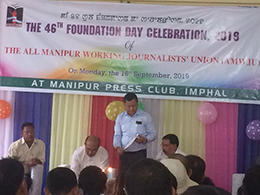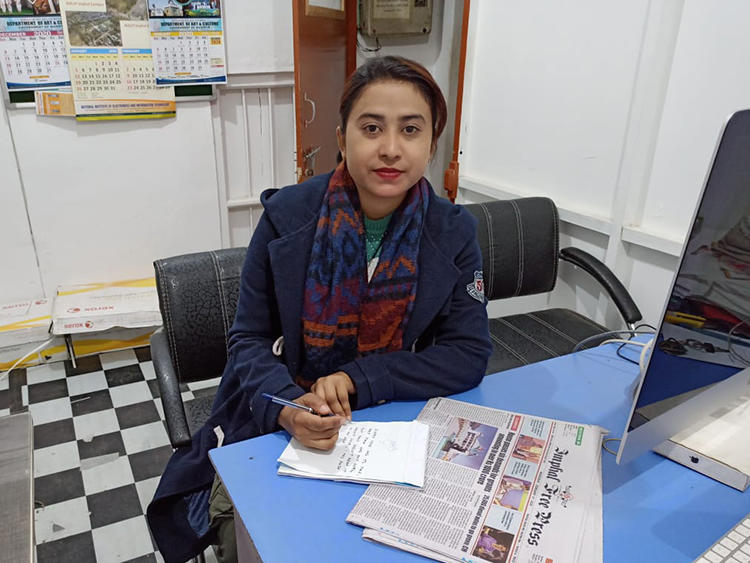On the morning of February 1, instead of working on her usual assignments for the Imphal Free Press, journalist Babie Shirin drove with the newspaper’s publisher Mayengbam Satyajit Singh to a court on the other side of town. On arrival, they were arrested, then granted bail on a bond of 30,000 rupees (US$420) each. Their “crime” was to document the local chief minister’s ranking in a nationwide TV poll.
The IFP, as the privately-owned, English-language daily refers to itself, operates in Imphal, the capital of Manipur, a small state on India’s northeast border with Myanmar. In 2018, the local government filed a criminal defamation case against the publication for reporting on the popularity of the state’s Chief Minister Nongthombam Biren Singh, as CPJ has documented and local media reported at the time. The Manipur High Court recently moved that case forward, Paojel Chaoba, a senior editor with the newspaper told CPJ by phone. His two colleagues were required to surrender at a lower court and get bail, he said, along with Pradeep Phanjoubam, a former IFP editor also named in the complaint. Hearings were ongoing in mid-February, Chaoba said.
CPJ interviewed Biren Singh about the case on a trip to Imphal in September 2019. CPJ also spoke with nearly a dozen senior journalists and editors, but almost none of them were willing to speak on record. Many shared privately that they were careful about criticizing the government to avoid criminal charges. Their concerns are shared beyond the state: CPJ has documented how defamation cases filed against journalists and media outlets have been used as a form of harassment and intimidation across India.
Manipur has faced a separatist movement since its integration into India, with the height of the armed conflict lasting nearly a decade before a ceasefire in 2018. Caught between underground separatist groups and the government, journalists were pressured and attacked; in 2013, newspapers stopped publication for four days to protest pressure from militant groups.
Journalists told CPJ that the security situation has improved since the ceasefire, and the pressures they used to face have eased. Recently, however, two Manipuri journalists have run into legal trouble in relation to political commentary published in a private capacity on social media. Kishore Chandra Wangkhem, a local TV reporter, spent 134 days in prison on sedition charges after sharing his opinion of the Bharatiya Janata Party (BJP) state government on social media, according to Outlook magazine, which documented his release in April 2019. In December, video blogger RK Echanthoibi was arrested for criticizing the government and the chief minister, according to news website Scroll.in. Echanthoibi was released on bail but the defamation investigation involving her comments is ongoing, she told CPJ by phone in February. CPJ requested comment on the charges against Wangkhem and Echanthoibi from Biren Singh’s media advisor and secretary, but did not receive a response before publication.
One editor of a newspaper in Manipur, who asked not to be named for fear of retribution, told CPJ that his newspaper shied away from government criticism to avoid controversy. The local BJP government was “ultra-sensitive,” he said.
“[Imphal] Free Press has been very bold,” he told CPJ. “We haven’t done that.”
Acting on directions from the secretary to the chief minister, the Manipur state department of home affairs instructed the public prosecutor to file the defamation case against the IFP journalists on October 27, 2018, according to an order that CPJ has reviewed. The order accused them of publishing with an “intent to create enmity, hatred or ill will between different classes” against the chief minister. Defamation carries up to two years imprisonment and possible fines under the Indian Penal Code.
The IFP article in question analyzed the reported results of a nationwide survey conducted by India Today TV, a New Delhi-based private news channel, to identify India’s “best performing” chief minister.
“I couldn’t believe the [chief minister] would come after me over such a silly matter,” Shirin told CPJ by phone. The 27-year-old journalist, who had been with IFP for less than a year at the time, said the case came as a shock. “Initially I was really nervous. I couldn’t concentrate on my work,” she said.
In a meeting with CPJ in September 2019, Chief Minister Biren Singh accused the newspaper of maligning his reputation by deliberately misinterpreting the survey results. “Criticism is okay, but decency should be there,” he said in his office. “They’re making a mockery, how can I allow that?”
Biren Singh is the former editor of a Manipuri-language daily called Naharolgi Thoudang. In April 2000, he was himself arrested for publishing comments by a local human rights activist that criticized the government. He spent 20 days in jail on sedition charges, which were ultimately quashed, according to news reports and human rights groups. Two years later, he joined electoral politics, and was eventually elected to do the top job in the state.

As a former journalist, Biren Singh has strong relationships throughout the media community. While CPJ was in Manipur, Biren Singh gave a speech at the All Manipur Working Journalists’ Union honoring its foundation 46 years before. He told CPJ about a health insurance scheme for journalists launched by his government.
Yet while the chief minister agreed that freedom of expression was a constitutional right that had to be protected, he also told CPJ there had to be a limit. “When we take advantage of Article 19, some people forget morality,” he said.
CPJ pointed out that he had himself been punished for his reporting. “I went to jail, too,” he said.
“Biren Singh seems to have completely forgotten that he was once a journalist,” Shirin told CPJ. “But I haven’t. I will continue to fight this case, as well as do my job.”
Phanjoubam, the former IFP editor, told CPJ that the defamation case sent a message to the the rest of the media that there would be consequences if they didn’t fall in line.
Since the case began, IFP has spent nearly 350,000 rupees (US$4,900) in legal fees and other costs, Paojel Chaoba told CPJ. While a New Delhi-based human rights lawyer initially offered to represent the newspaper pro-bono, IFP couldn’t afford the cost of flying him to Imphal for hearings, he said. Because the case had a link to the chief minister, it was difficult for IFP to find representation locally, according to Chaoba.
“Instead of doing our work as journalists, the last one and half years have been spent hiring lawyers, strategizing, raising money to pay lawyers,” said Chaoba. “Fighting a legal case against the might of the state isn’t easy,” he said. “But we are not going to give up on our principles.”
Kunal Majumder, CPJ’s India Correspondent, is based in New Delhi. Aliya Iftikhar is CPJ’s Senior Asia Researcher in New York.
EDITOR’S NOTE: The spelling of Paojel Chaoba’s name has been corrected in the second and penultimate paragraph.
